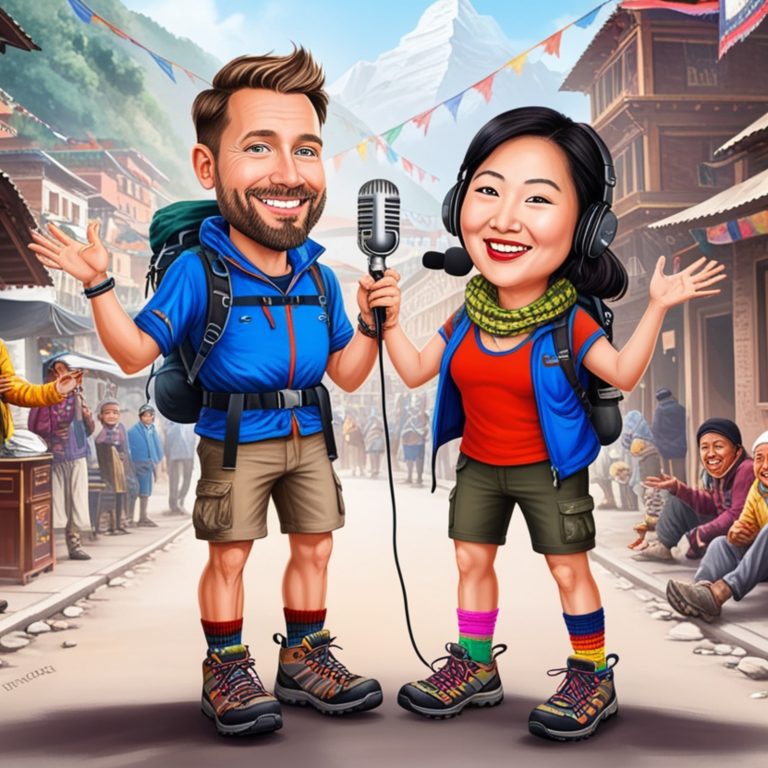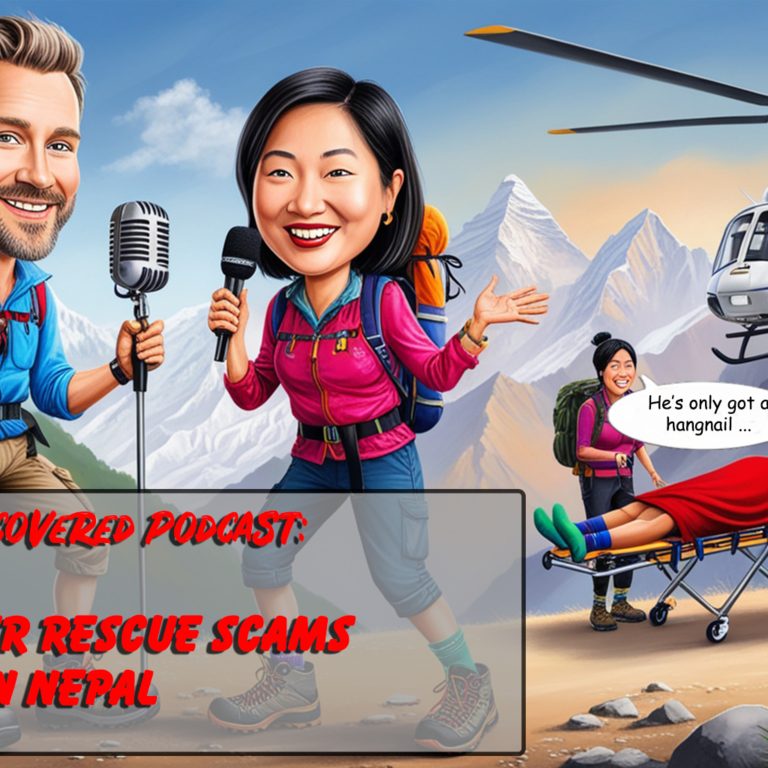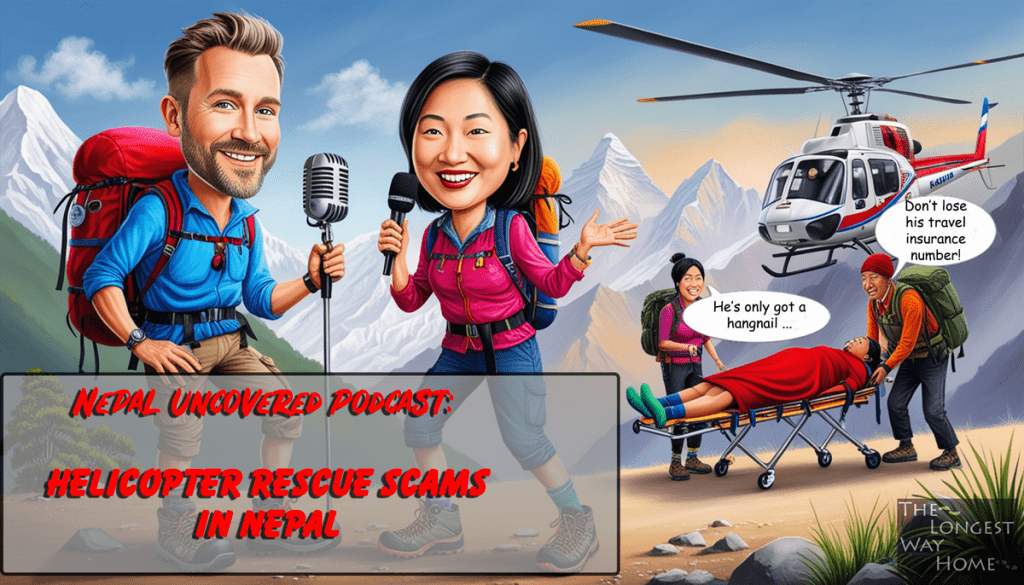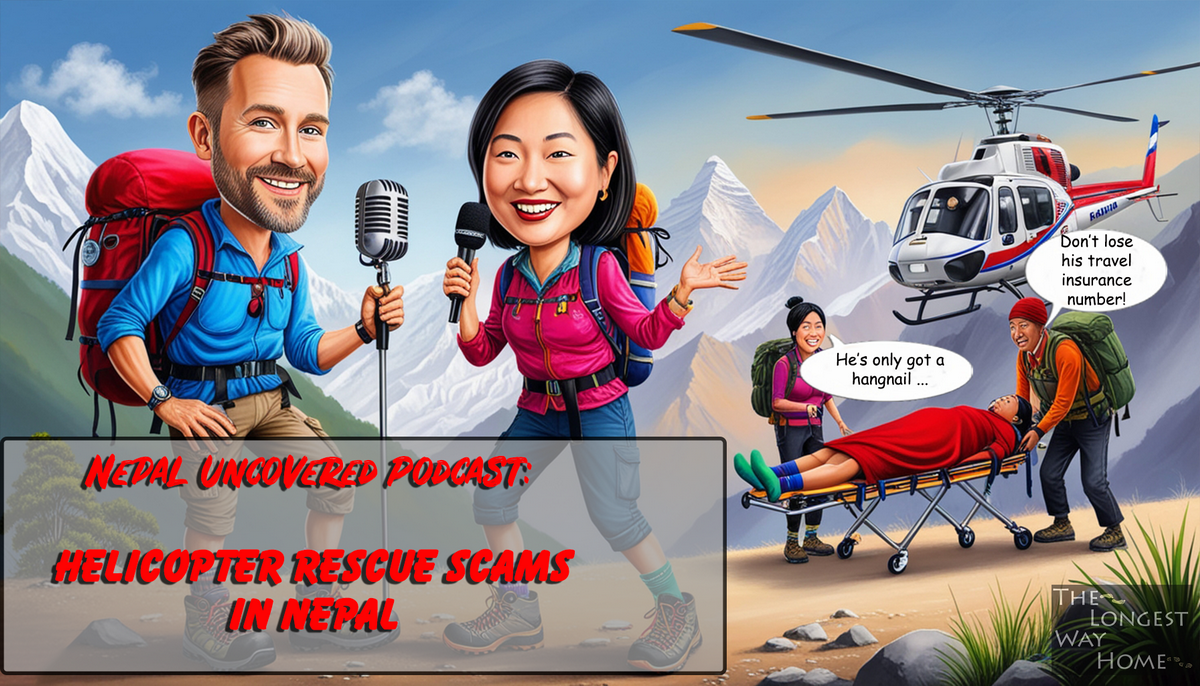
Join two engaging hosts and renowned guidebook author David Ways for an insider’s look at Nepal. Each Monday episode unpacks essential travel topics through three unique perspectives, blending expert knowledge with real experiences.
From arrival logistics to trekking tips, packing essentials to hidden gems, discover Nepal’s secrets through practical advice and engaging stories. Whether planning your first visit or seeking deeper insights, Nepal Uncovered delivers the knowledge and inspiration you need.
Features:
Expert guidance from Nepal’s leading guidebook author
Practical travel insights
Discover the shocking reality behind Nepal’s rampant helicopter rescue scams. Join hosts as they unpack how unethical guides, trekking companies, and hospitals work together to stage fake emergencies and bilk insurance companies—all at the expense of genuine trekkers.
Based on extensive research by Nepal guidebook author David Ways, this eye-opening episode reveals the various schemes: from deliberately causing illness in trekkers and pushing unnecessary evacuations to creating unrealistic itineraries designed to fail. Learn why attempts to regulate this practice have stalled and how powerful interests keep this lucrative scam running.
Whether you’re planning your dream Himalayan adventure or simply curious about the ethics of adventure tourism, this episode provides essential insights into protecting yourself and traveling responsibly in one of the world’s most breathtaking destinations.
Source: https://www.thelongestwayhome.com/blog/nepal/helicopter-scams-in-nepal/


Episode 9 – Helicopter Rescue Scams in Nepal: The Dark Side of Nepal’s Trekking Industry
Transcript
But then what happens when that dream turns into a nightmare? Right. That’s what we’re talking about today.
[Speaker 2] Ah, good. [Speaker 1] So David Ways actually starts by talking about his own experience back in 2011. [Speaker 2] Okay. [Speaker 1] He met this trekker from Italy who seemed to just all of a sudden have this, like, debilitating back problem. Wow. It seemed really serious at the time.And they ended up needing to get a helicopter evacuation.
[Speaker 2] Yeah. You know, that’s often how these scams begin. [Speaker 1] Oh, really? [Speaker 2] Yeah. The trekker might have, like, a real ailment. [Speaker 1] Okay. [Speaker 2] But it might be something that could be managed by just, you know, going to a lower altitude. Ah. You know, it’s not necessarily an emergency. [Speaker 1] I see. [Speaker 2] Yeah. [Speaker 1] And get this, just a week later, Ways saw this same trekker. [Speaker 2] Oh, no. [Speaker 1] Walking around Kathmandu, like, totally fine. [Speaker 2] Wow. [Speaker 1] I know, right? [Speaker 2] That’s wild. [Speaker 1] It’s almost comical if it weren’t so concerning. [Speaker 2] It’s really, you know, it’s not a laughing matter because it’s not just about the financial aspect. It’s also a safety issue. [Speaker 1] Right, right. So let’s break down, like, the different ways these scams can actually play out. [Speaker 2] Okay, yeah. [Speaker 1] So Ways outlines, like, several scenarios. [Speaker 2] Okay. [Speaker 1] One is what he calls the evacuation when not needed scam. [Speaker 2] Okay. [Speaker 1] So think, you know, minor symptoms. Got it. Like a headache. [Speaker 2] Uh-huh. [Speaker 1] A sprained ankle. An upset stomach. [Speaker 2] Yeah. [Speaker 1] Things that you could, you know, take care of pretty easily. [Speaker 2] Yeah. [Speaker 1] They don’t necessarily need a helicopter rescue. [Speaker 2] Right, right. But, you know, some of these guides, they might take advantage of the trekker’s, you know, anxieties. [Speaker 1] Yeah. [Speaker 2] Especially if they’re inexperienced. [Speaker 1] Oh, yeah. [Speaker 2] And they kind of push for this helicopter evacuation. [Speaker 1] Like, they make it seem like it’s the only option. [Speaker 2] Exactly. [Speaker 1] It must be scary. I mean, you’re in a vulnerable position, you’re far from home, maybe dealing with altitude sickness. [Speaker 2] Absolutely. Fear is a huge factor in these scams. [Speaker 1] Wow. Okay. So then there’s also something called the no time for a full trek scam. [Speaker 2] What’s that? [Speaker 1] So, imagine, like, you’ve always wanted to go to Everest Base Camp. [Speaker 2] Mm-hmm. [Speaker 1] But you have limited time. [Speaker 2] Okay. Yeah. [Speaker 1] Some companies might offer you, like, these crazy cheap and short itineraries. [Speaker 2] Mm-hmm. [Speaker 1] Promising to get you there and back really quickly. [Speaker 2] Yeah. [Speaker 1] Sounds tempting, right? [Speaker 2] Yeah, of course. But what’s the catch? [Speaker 1] Well, these rushed itineraries are totally unrealistic. [Speaker 2] Oh, I see. [Speaker 1] And they can really put trekkers at risk. And then, surprise, surprise, a medical emergency happens. [Speaker 2] Wow. [Speaker 1] And they need a helicopter evacuation. [Speaker 2] So you’re basically set up to fail. [Speaker 1] Yeah. It’s like they’re creating the problem just to, like, sell you the solution. [Speaker 2] That’s a really good way to put it. [Speaker 1] Right. Okay. So there’s another variation. [Speaker 2] Okay. [Speaker 1] It’s called the two for the price of one scam. [Speaker 2] Okay. [Speaker 1] So picture this. A helicopter is already on its way for an evacuation. [Speaker 2] Okay. [Speaker 1] Maybe for a trekker who has a staged illness or a minor injury, whatever. And then, all of a sudden, another sick trekker appears. [Speaker 2] Oh, wow. [Speaker 1] Needing an evacuation as well. [Speaker 2] Convenient. [Speaker 1] Yeah, very convenient. [Speaker 2] Double dipping. [Speaker 1] Yeah. The helicopter takes both trekkers and both insurance companies get billed. [Speaker 2] Oh, my gosh. [Speaker 1] I know. [Speaker 2] That’s awful. [Speaker 1] For separate evacuations, even though they could have just taken one flight. [Speaker 2] Mm. [Speaker 1] It’s crazy. [Speaker 2] Yeah. [Speaker 1] And it doesn’t stop there. [Speaker 2] Really? There’s more. [Speaker 1] There’s the let me out of hospital scam. [Speaker 2] Okay. [Speaker 1] This one actually targets people who genuinely get sick, often from altitude sickness. [Speaker 2] Oh, so they’re really sick. [Speaker 1] Yeah. [Speaker 2] Okay. [Speaker 1] So maybe you’ve descended. You’ve received some treatment. You’re feeling a little bit better. [Speaker 2] Okay. [Speaker 1] But some hospitals, they’ll insist on all these unnecessary tests. [Speaker 2] Mm-hmm. [Speaker 1] And a prolonged stay. [Speaker 2] Yeah. [Speaker 1] And, of course, all this just racks up these crazy bills. [Speaker 2] And then they just send that to the insurance? [Speaker 1] Exactly. [Speaker 2] Mm. [Speaker 1] It’s terrible how someone’s genuine medical need is being exploited. [Speaker 2] It’s awful. They’re basically trapped. [Speaker 1] Yeah. [Speaker 2] In the system. [Speaker 1] Ugh. Okay, there’s more. [Speaker 2] Oh, no. [Speaker 1] We’ve got the weather is bad scam. [Speaker 2] What’s that? [Speaker 1] So imagine you’re on your way back from a trek, heading to a mountain airport to catch your flight. [Speaker 2] Okay. [Speaker 1] You’re tired. You’re ready to go home. [Speaker 2] Mm. [Speaker 1] And then your guide is like, oh, the weather’s terrible at your destination. [Speaker 2] Even if it’s clear where you are. [Speaker 1] Exactly. [Speaker 2] Oh. [Speaker 1] So you’re stuck. You might miss your connecting flight. You’re starting to panic. [Speaker 2] Ugh. [Speaker 1] And what’s the convenient solution? [Speaker 2] Helicopter, of course. [Speaker 1] Yep. A very costly helicopter ride. [Speaker 2] Wow. So they’re creating obstacles just to make a profit. [Speaker 1] Yeah. Wow. Okay.And then, finally, we have the super cheap trek scam.
[Speaker 2] Okay. [Speaker 1] This targets budget-conscious travelers. [Speaker 2] Ah! Okay. [Speaker 1] So the company will advertise this ridiculously low price for a popular trek. [Speaker 2] Okay. [Speaker 1] They’re barely breaking even on the trek itself. [Speaker 2] I see. [Speaker 1] But what’s the catch? [Speaker 2] What’s the catch? [Speaker 1] They’re going to make their money off of the helicopter evacuation later. [Speaker 2] So the whole point is to get you on that helicopter. [Speaker 1] Pretty much. [Speaker 2] That’s awful. [Speaker 1] It’s like bait and switch. [Speaker 2] Yeah. [Speaker 1] Low price, and then they make their money on the back end. [Speaker 2] Wow. So these scams really point to a disturbing trend in the industry. It’s not just about genuine experiences anymore. [Speaker 1] Right. [Speaker 2] It’s about profit. [Speaker 1] Yeah. At any cost. [Speaker 2] At any cost. And it gets even more unsettling as you dig deeper into the problem. Waze actually uncovered reports of trekkers being purposely made ill to justify evacuations. [Speaker 1] Really? So they’re not just exaggerating symptoms. They’re, like, actually making people sick. [Speaker 2] Yeah. It seems that way. There’s evidence that suggests some folks are going to, like, extreme lengths to stage these things. [Speaker 1] Wow. [Speaker 2] Waze mentions one method is using baking soda. [Speaker 1] Baking soda. [Speaker 2] To induce diarrhea. [Speaker 1] Wow. That’s crazy. It goes way beyond, like, simple dishonesty. [Speaker 2] Yeah. [Speaker 1] It’s, like, a total disregard for someone’s health and safety. [Speaker 2] Absolutely. It really brings us to the question of accountability. [Speaker 1] Yeah. Who’s responsible? [Speaker 2] Right. Who is responsible for stopping this? [Speaker 1] Is it the trekking agencies? [Speaker 2] Yeah. [Speaker 1] Or the hospitals? Huh? The helicopter companies?Yeah. Or even some of the tourists themselves?
[Speaker 2] It’s tough to say. It’s really a mix of things. Waze points to poor regulation. [Speaker 1] Okay. [Speaker 2] And oversight as, like, creating this environment where these scams can just thrive. [Speaker 1] So it’s like the Wild West of tourism. [Speaker 2] Kind of. Yeah. Everyone’s looking to make a quick buck, and there are almost no consequences. [Speaker 1] So, I mean, have there been any attempts to fix this? [Speaker 2] Yeah. [Speaker 1] Anything at all? [Speaker 2] One idea was to give control of all the rescues to the Nepali police force. [Speaker 1] Oh, that makes sense. [Speaker 2] Yeah. [Speaker 1] So having, like, a neutral third party… [Speaker 2] Exactly. [Speaker 1] …would make sure evacuations only happen when it’s really necessary? [Speaker 2] Uh-huh. [Speaker 1] So that would eliminate the conflict of interest, I guess. [Speaker 2] Exactly. [Speaker 1] But why didn’t that happen? [Speaker 2] It’s unclear. It seemed to have some support at first, but then it just fizzled out. [Speaker 1] Really? [Speaker 2] As of January 2025, there’s still nothing like that in place. [Speaker 1] So there’s still no real way to make sure that a rescue operation is legitimate? [Speaker 2] Pretty much. [Speaker 1] Wow. What are the consequences of this? [Speaker 2] Well, one major concern is, you know, for trekkers who really need help… [Speaker 1] Yeah. [Speaker 2] …imagine someone who is experiencing, like, severe altitude sickness. [Speaker 1] Yeah. [Speaker 2] They need to be evacuated immediately, but all the helicopters are busy transporting people with, you know, minor or fake issues. [Speaker 1] So they might not be able to get help when they really need it. [Speaker 2] Exactly. [Speaker 1] Oh, that’s scary. [Speaker 2] Yeah. And then there’s the financial fallout. [Speaker 1] Right. [Speaker 2] All these scams drive up insurance premiums. [Speaker 1] Yeah. Making it more expensive for everyone to trek. [Speaker 2] It’s a vicious cycle. [Speaker 1] Right. The scammers profit, insurance companies raise their rates, and then honest trekkers, they’re the ones who foot the bill. [Speaker 2] Exactly. And what about Nepal’s reputation as a trekking destination? [Speaker 1] Yeah, I was just thinking that. If it gets too expensive or if insurance companies don’t want to cover treks in Nepal, who’s going to want to go? [Speaker 2] Exactly. It’s like they’re slowly killing the very industry that they rely on. [Speaker 1] And it’s not just about money. It’s about trust. How can you trust your guide if you think they might be in on a scam? [Speaker 2] Right. It really undermines the whole experience. [Speaker 1] So I know you mentioned the police idea. Have there been any other ideas to try and fix this? [Speaker 2] Well, Waze also mentions creating a national trekking insurance scheme. [Speaker 1] A national insurance? [Speaker 2] Yeah. The idea is to have all trekkers covered by, like, a single national insurance plan. [Speaker 1] Oh, interesting. So instead of relying on private insurance, everyone would be covered by this, like, one big umbrella. [Speaker 2] Exactly. It’s similar to what Thailand’s done with boat trips. [Speaker 1] Oh, right, right. I’ve heard of that. So this could, like, cut out the middlemen and maybe reduce the opportunity for fraud. [Speaker 2] Right. But there are some challenges with that, too. [Speaker 1] Yeah, what would those be? [Speaker 2] Well, logistically, I mean, setting up and managing a national insurance scheme for trekkers would be huge. [Speaker 1] Oh, yeah. [Speaker 2] And then there’s the issue of transparency and accountability. [Speaker 1] Like making sure the same people who are running the scams aren’t the ones running the insurance. [Speaker 2] Exactly. It would require a real shift in mindset and a serious commitment from the government. [Speaker 1] Right. To make sure it’s fair. [Speaker 2] So I know Waze last updated this in January 2025. Has anything changed? [Speaker 1] Well, he did mention a pretty discouraging development. Apparently, the Sulukumbu Rural Municipality, which includes Everest, they tried to ban commercial helicopter tours. [Speaker 2] Oh, really? [Speaker 1] Yeah. They were trying to reduce all the helicopter traffic. [Speaker 2] Okay. [Speaker 1] Because it was disrupting the trekking experience and hurting local businesses. [Speaker 2] Yeah. I can see how that would be a problem. But the helicopter companies pushed back, right? [Speaker 1] Oh, big time. They threatened to stop rescue and cargo flights if the ban went through. [Speaker 2] Wow. So they were basically holding essential services hostage. [Speaker 1] Pretty much. It’s a real power struggle, you know? Yeah.You have local communities trying to protect their environment and livelihoods. Right. And then you have these big companies that only care about profit.
[Speaker 2] And in this case, it sounds like the companies won. [Speaker 1] Sadly, yeah. The tours are back on. [Speaker 2] So, I mean, this all sounds pretty bleak. [Speaker 1] Yeah. [Speaker 2] It feels like despite years of warnings, nothing is really changing. [Speaker 1] It’s really discouraging. [Speaker 2] Yeah. [Speaker 1] It really makes you wonder if there’s any hope for a solution. [Speaker 2] Yeah. [Speaker 1] It really does feel that way sometimes. [Speaker 2] Yeah. [Speaker 1] It makes you wonder, you know, what can trekkers do to protect themselves? [Speaker 2] Right. It’s like you have to be a detective just to plan a trek in Nepal. [Speaker 1] I mean, it shouldn’t have to be that way. [Speaker 2] Right. [Speaker 1] But awareness is key, right? I mean, the vast majority of Nepali guides and trekking companies, they’re honest. They’re ethical.But these scams exist, and it can be tough to know what to look for.
[Speaker 2] So, what are some red flags? Like, what should we be watching out for? [Speaker 1] Well, first off, if a trek seems too cheap to be true, it probably is. [Speaker 2] Yeah. That makes sense. So, you’re saying do your research, compare prices, read reviews. [Speaker 1] Yeah. Absolutely. And don’t just focus on price.Okay. Yeah. You know, look for companies that put safety first, that have really experienced guides, that have a good reputation for being ethical.
[Speaker 2] Okay, good advice. And, I mean, also make sure you have really good travel insurance that specifically covers helicopter evacuation. Yes, definitely.But even with insurance, be careful. If your guide is pushing for a helicopter evacuation for something that seems minor, trust your gut. Okay.
Ask questions. Yeah. Get a second opinion if you can.
[Speaker 1] So, you really have to advocate for yourself. [Speaker 2] Absolutely. [Speaker 1] Don’t be afraid to push back if something feels wrong. [Speaker 2] Exactly. Your safety is the most important thing. [Speaker 1] Right. So, Waze also talks about Global Rescue. It’s a search and rescue organization that’s been trying to expose these scams. [Speaker 2] They have, and they’ve run into some pretty serious resistance. [Speaker 1] Oh, really? [Speaker 2] Waze suggests that there are some powerful people who benefit from this whole thing staying the way it is. [Speaker 1] Wow. So, it sounds like this problem is really deep-rooted. It’s not just a few bad apples. [Speaker 2] Yeah. [Speaker 1] We’re talking about a whole system that needs to change. [Speaker 2] Exactly. [Speaker 1] It’s that same pattern, isn’t it? [Speaker 2] Yeah. [Speaker 1] Like, weak regulations plus the desire for easy money. [Speaker 2] It’s a recipe for disaster. Unfortunately, this happens in so many parts of the tourism industry, and not just in Nepal. [Speaker 1] So, we have to be aware, and we have a responsibility to travel ethically. [Speaker 2] Right. I mean, we’re not just consumers. We can influence the industry through the choices we make. [Speaker 1] It’s not just about finding the cheapest trip. It’s about choosing companies that are doing things right. [Speaker 2] Treating their employees well, protecting the environment, and respecting local communities. [Speaker 1] Exactly. And in the case of Nepal, it’s about protecting trekking and making sure that it’s a safe and amazing experience for everyone. [Speaker 2] Absolutely. [Speaker 1] Dave Waze is clearly really passionate about Nepal, and he’s worried about this problem. [Speaker 2] He’s right to be worried. [Speaker 1] Yeah. And he dedicated a lot of his website, The Longest Way Home, to explaining this issue. [Speaker 2] It’s an excellent resource for anyone planning a trek to Nepal. [Speaker 1] Yeah. [Speaker 2] He gives you all the info about these schemes, safety tips, and even recommends good trekking companies. [Speaker 1] And he’s written some guidebooks too, right? [Speaker 2] Yeah, all about ethical trekking and responsible tourism. [Speaker 1] So, for anyone who wants to learn more, definitely check out his work. [Speaker 2] Absolutely. [Speaker 1] Well, this has been a pretty eye-opening look at the dark side of adventure travel. [Speaker 2] It has, but it’s a conversation we need to be having. [Speaker 1] Absolutely. Awareness is the first step. So, as we wrap up today, I want to leave everyone with a question to think about. [Speaker 2] Okay, what’s that? [Speaker 1] What is our responsibility as tourists when we travel to these fragile places? Are we just consumers of experiences, or do we owe something to the people and places we visit? [Speaker 2] That’s a really important question. It’s easy to get caught up in the excitement of travel, but we can’t forget that our choices matter. [Speaker 1] Exactly. Well, thanks for joining us for this deep dive on helicopter rescue scams in Nepal. It’s a tough subject, but hopefully now you’re all a little bit more informed. [Speaker 2] And if you’re thinking of trekking in Nepal, be safe, choose ethical companies, and get good insurance. But most importantly, travel with respect. [Speaker 1] That’s great advice. Thanks for listening, everyone.


Leave a Reply